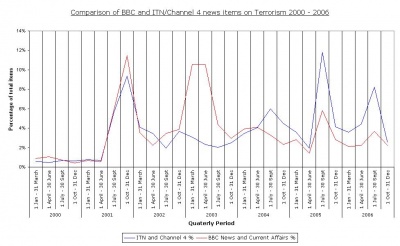Terrorexpertise:BBC
N.B. This page relates to the BBC's coverage of terrorism and use of terrorism experts. A separate page deals with the BBC in general.
Contents
BBC Coverage of Terrorism
The graph on the right shows the percentage of items on terrorism returned during quarterly periods between 2000 and 2006 on the BBC compared with ITN and Channel 4. The graph apparently shows an increase in items on terrorism following attacks in New York, Madrid and London, and the Israeli-Lebanon war. It also shows a marked increase in BBC items on terrorism at the end of 2002 and beginning of 2003 which is not apparent in ITN and Channel 4 coverage.
Use of Terrorism Experts
Remuneration of external experts
BBC News does not retain any experts and commentators on terrorism, security and intelligence matters on contract. We do sometimes pay a disturbance fee to contributors who make their living from selling their expertise (such as journalists, academics and members of think tanks) but many commentators do not ask for or expect any fee. Where payments are made, radio programmes, like “Today”, have a flat rate of £50. There is occasionally scope to exercise discretion, but it would be on a case by case basis. In daily Television News we have a basic disturbance fee of £50. This can be negotiable in certain circumstances, usually to an upper limit of £75. However, if we ask an interviewee to stay on set for longer periods (e.g. as a "presenter's friend") we will pay more, up to £350 for a five hour period, for example.[1]
BBC Editorial Guidelines on Terrorism
Terrorism
We must report acts of terror quickly, accurately, fully and responsibly. Our credibility is undermined by the careless use of words which carry emotional or value judgements. The word "terrorist" itself can be a barrier rather than an aid to understanding. We should try to avoid the term, without attribution. We should let other people characterise while we report the facts as we know them.We should not adopt other people's language as our own. It is also usually inappropriate to use words like "liberate", "court martial" or "execute" in the absence of a clear judicial process. We should convey to our audience the full consequences of the act by describing what happened. We should use words which specifically describe the perpetrator such as "bomber", "attacker", "gunman", "kidnapper", "insurgent, and "militant". Our responsibility is to remain objective and report in ways that enable our audiences to make their own assessments about who is doing what to whom.[2]
